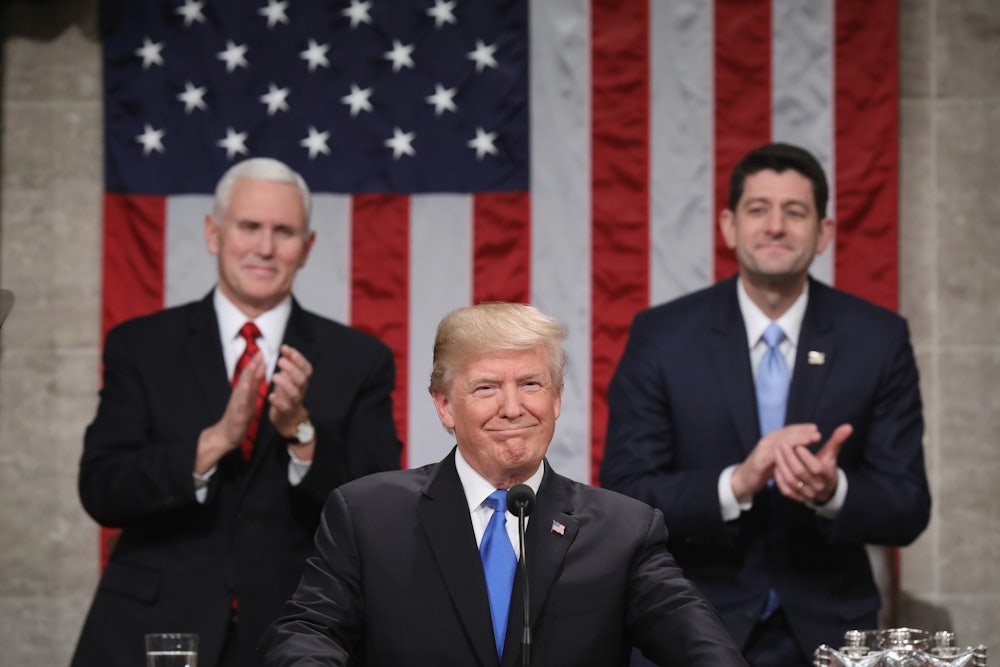A year ago, Donald Trump stood before a joint session of Congress and delivered a boring presidential speech. Nothing about it was memorable except the response, with Trump being applauded from nearly all corners. Van Jones said Trump “became president of the United States” when he honored a fallen Navy Seal. The New York Times’s Glenn Thrush wrote that it was “the most presidential speech Mr. Trump has ever given—delivered at precisely the moment he needed to project sobriety, seriousness of purpose, and self-discipline.” A day later, The Washington Post reported that Attorney General Jeff Sessions did not disclose to Congress conversations he had had with Sergey Kislyak, the Russian ambassador to the U.S., during the election. The conversation quickly shifted to the Trump campaign’s alleged ties to the Kremlin, and Trump’s cameo as a normal president was quickly forgotten.
Tuesday night’s State of the Union was similar in tone to last year’s address: It was bland, full of platitudes. And like most presidential platitudes, they had an uncomfortable relationship with the truth. He said that his policies were based on compassion, not resentment. That the economy is thriving because of his leadership, not in spite of it. That the immigration package proposed by his administration is a “down-the-middle compromise.” That African-American and Hispanic communities were doing historically well under his administration, and that “struggling communities, especially immigrant communities,” will benefit from drastically curbing legal immigration. For the first time in weeks Trump acknowledged the daily struggles of Puerto Rico, presenting its recovery from a hurricane as a success story a day after his administration ended food and water aid to the territory.
There were a few Trumpian flourishes, yes. Trump used a boy to ding NFL players who kneeled during the national anthem to protest police brutality. Citing Preston Sharp, a 12-year-old who placed flags by the graves of soldiers on Veterans Day, Trump said, “Preston’s reverence for those who have served our nation reminds us why we salute our flag, why we put our hands on our hearts for the pledge of allegiance, and why we proudly stand for the national anthem.”
This deviation from the speech’s overall themes of national unity and unstoppable progress culminated in an in-depth discussion of immigration. Trump began with the kind of blood-and-soil rhetoric that characterized his Republican National Convention speech in 2016 and his “American Carnage” inaugural address. Having brought the families of two teenagers who were murdered by MS-13 gangs to the State of the Union, Trump called on Congress to pass immigration reform. “I am calling on the Congress to finally close the deadly loopholes that have allowed MS-13, and other criminals, to break into our country,” Trump said. “We have proposed new legislation that will fix our immigration laws, and support our ICE and Border Patrol Agents, so that this cannot ever happen again.” He was at his most energized during this portion of the speech.
This was the Trump we have come to expect, the demagogue who ties the fate of millions of immigrants to a small and deadly street gang. He used this bit to outline the four pillars of his administration’s immigration policy: a path to citizenship for some immigrations who came to the United States as children; a border wall; ending the visa lottery; and ending “chain migration,” the (incorrect) notion that immigrants can bring whole extended families with them into the United States. The MS-13 riff was a jarring grace note, designed to appease the supporters who have decried Trump’s immigration policy as amnesty. It was Trump trying to have it every way possible, the nativist blowing on a dog whistle while claiming that he was offering a fair deal to Democrats.
But for the most part Trump stuck to the usual State of the Union bromides. (One example: “We can lift our citizens from welfare to work, from dependence to independence, and from poverty to prosperity.”) He has a knack for making them sound more hollow than they usually do, perhaps because he is living, breathing evidence that the American experiment has taken a horrible wrong turn. Still, the bland ritual of the State of the Union served its purpose. The speech not only communicated his administration’s priorities to the country, but also made them seem normal by the force of that very ritual.
Trump’s immigration policy, for instance, would dramatically remake the country’s entire immigration system. It would cut legal immigration to the country, which would have serious economic effects. It would prevent the families of immigrants from joining them in the United States. It would change the ethos of this country from one that provides succor to the “huddled masses yearning to breathe free,” to that which lets immigrants in based on their supposed “merit.” It is cruel and impractical, but all of this is laundered via teleprompter as the normal stuff in a president’s agenda.
The boring-ness of the State of the Union is a cover for the various ways the administration is a deviation from historic norms. Last year, it worked: The mainstream pundits whose approval Trump desperately craves gushed for nearly 24 hours. They might again this year. But the news cycle will move on, and everyone will be reminded, yet again, just how abnormal this president really is.
